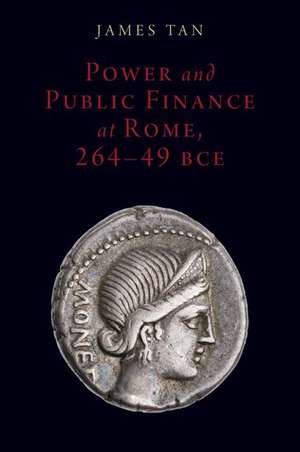Power and Public Finance at Rome, 264-49 BCE: Oxford Studies in Early Empires
Autor James Tanen Limba Engleză Hardback – 13 apr 2017
Preț: 641.46 lei
Preț vechi: 858.09 lei
-25% Nou
Puncte Express: 962
Preț estimativ în valută:
122.74€ • 128.50$ • 101.56£
122.74€ • 128.50$ • 101.56£
Carte tipărită la comandă
Livrare economică 25-31 martie
Preluare comenzi: 021 569.72.76
Specificații
ISBN-13: 9780190639570
ISBN-10: 0190639571
Pagini: 248
Dimensiuni: 157 x 236 x 25 mm
Greutate: 0.48 kg
Editura: Oxford University Press
Colecția OUP USA
Seria Oxford Studies in Early Empires
Locul publicării:New York, United States
ISBN-10: 0190639571
Pagini: 248
Dimensiuni: 157 x 236 x 25 mm
Greutate: 0.48 kg
Editura: Oxford University Press
Colecția OUP USA
Seria Oxford Studies in Early Empires
Locul publicării:New York, United States
Recenzii
This revelatory book creatively employs the methods of fiscal sociology to provide new perspectives on Rome's turbulent politics. Tan's accessible vision of a republic ruined by a predatory elite, an inattentive populace, and destabilizing concentrations of wealth is a cautionary tale that would benefit an audience of concerned scholars outside the narrow circle of ancient historians.
This exciting, accessible book about finance in the Roman Republic breaks new ground and challenges old paradigms. ... The argument is nevertheless vitally important for ancient historians; modern economic theorists will also gain much from this study. ... Summing Up: Highly recommended. Most levels/libraries.
In this wonderfully thought-provoking book, James Tan examines Rome's fiscal skeleton to produce an original treatment of the state and society of the Roman Republic. Rich with sociological insights, the book proves that there are still lessons to be learned from Roman history. Tan demonstrates how tax revenue shaped politics in Rome and how the spoils of empire ultimately ruined its chances for democracy.
A blockbuster of a book, Power and Public Finance at Rome, 264-49 BCE is bound to unsettle everything we thought we knew about the economics of Republican imperialism. Tan zeros in on the crucial questions: Who has the money? Who doesn't? Why? And what are the implications? In answering them, he opens a strikingly new perspective on the decisions that determined who benefited from the profits of empire.
This exciting, accessible book about finance in the Roman Republic breaks new ground and challenges old paradigms. ... The argument is nevertheless vitally important for ancient historians; modern economic theorists will also gain much from this study. ... Summing Up: Highly recommended. Most levels/libraries.
In this wonderfully thought-provoking book, James Tan examines Rome's fiscal skeleton to produce an original treatment of the state and society of the Roman Republic. Rich with sociological insights, the book proves that there are still lessons to be learned from Roman history. Tan demonstrates how tax revenue shaped politics in Rome and how the spoils of empire ultimately ruined its chances for democracy.
A blockbuster of a book, Power and Public Finance at Rome, 264-49 BCE is bound to unsettle everything we thought we knew about the economics of Republican imperialism. Tan zeros in on the crucial questions: Who has the money? Who doesn't? Why? And what are the implications? In answering them, he opens a strikingly new perspective on the decisions that determined who benefited from the profits of empire.
Notă biografică
James Tan studied ancient history at The University of Sydney and at Columbia University, and works mainly in the fields of Roman political and economic history. He was Visiting Professor of Classics at Union College in Schenectady NY, and is now Assistant Professor of History and Classics at Hofstra University in Hempstead NY.














